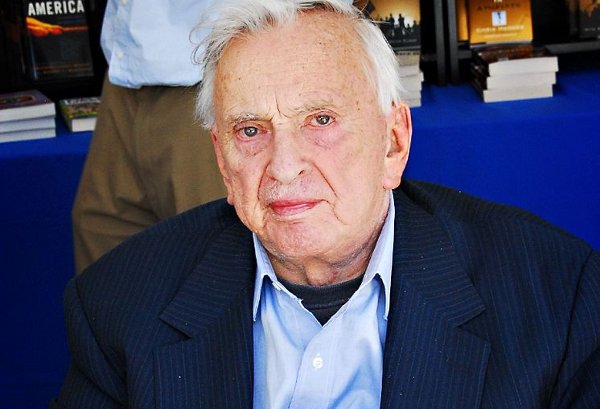Gore Vidal: A Remembrance


Born into privilege, Gore Vidal lived 5 lives simultaneously. I can barely get to work everyday, raise my son and emotionally participate in my family, while Vidal was a novelist, socialite and periodic politician with an acute sense of American history and culture. Vidal published numerous novels, nearly got punched out by William F. Buckley on national television during the 1968 Democratic convention, got head butted and punched by Norman Mailer after calling him out about his misogyny, ran for office twice and was unapologetic about his promiscuous homosexuality, claiming to have had over 1000 sexual encounters. In this, he was outdone by Wilt Chamberlain, the track star and basketball player, who said that he had 10000 straight ones, but then Wilt wasn't writing all those novels and going to all those parties.
Given all this and more, it is easy to get lost in the dense forestation of Vidal's life and miss some of the obvious things that were important about him. Most importantly, Vidal was a powerful, consistent voice about the violence inherent within American capitalism, popularizing the notion of an American empire long before it became fashionable. He opposed the Vietnam War, spoke out about nuclear proliferation (with, humorously enough, Norman Mailer) and highlighted the cowboy mentality of US covert operations around the world in places like Central and South America. Just as a billboard in Idaho has angered people by stating that President Obama has killed far more people than James Holmes did in Aurora, Vidal blandly observed that Timothy McVeigh was no more of a killer than Eisenhower. In this, Vidal implicitly touched upon our unwillingness to confront the extreme violence of the representatives of the state while condemning the relatively lesser violence of individuals. There was, over the course of his life, an anarchic thread in his thought even if he was no anarchist. As you would have expected, he was an incisive critic of the war on terror in the final years of his life.
Culturally, Vidal was a rebel in the right place at the right time. While refusing to characterize himself in terms of sexual orientation, he was, in the expanding horizons of the immediate post-war era, openly gay, without, oddly enough, drawing a great deal of attention to it. So much so that he polled more votes as a Democratic candidate in a conservative, upstate New York congressional district in 1960 than any other Democratic candidate had done in 50 years. He was matter of fact about his preference for men and his promiscuity, thus demonstrating that it was no longer possible to require people to conform to a public expectation of straight monogamy regardless of how they lived privately, personally foreshadowing the sexual revolution of the 1960s and the gay rights movement of the 1970s.
Of course, Vidal's privileged background provided him with advantages in this regard, but he was still taking risks. He maintained that theNew York Times nearly killed his literary career in the 1950s because of a novel that he wrote with an expressly gay protagonist, and Buckley no doubt thought that he was damaging Vidal greatly by calling him queer on national television in 1968. Buckley, perhaps confused by Vidal's evasions about his sexuality, thereafter characterized him as an evangelist for bisexuality and an advocate for the acceptability of homosexuality. Vidal was much better in taking the true measure of Buckley, as he did when asked about how he felt about Buckley's death: I thought hell is bound to be a livelier place, as he joins forever those whom he served in life, applauding their prejudices and fanning their hatred. For people like Buckley, Vidal was a provocation in all aspects of his life, public and private. May he rest in peace.
(This originally appeared at American Leftist)


